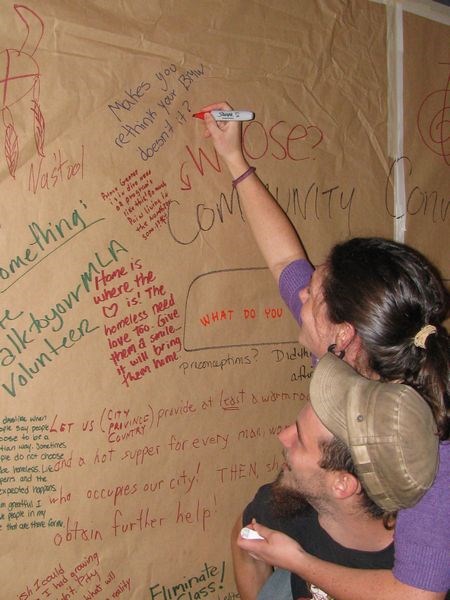The homeless in Prince George are not without a voice and are now speaking out through moving and thought-provoking art, featured in an exhibit at Art Space until Oct. 30.
The exhibit, entitled FUSE, challenges the public to reconsider their views of homelessness, woman who work the streets to survive and the severity of women and children living in poverty across the province and the country.
"When a person is attached to the descriptor 'homeless' that person gets lost. It's important for the people of Prince George to come and rethink their perspectives and breakdown the stereotypes," said Dahne Harding, project co-ordinator.
"We've called the exhibit FUSE because it's the fused experience of social justice activists across the North, students and faculty at UNBC and the women who live and work the streets in Prince George."
Every Sunday, the association for Advocating for Women And Children (AWAC) hold art sessions for women to come and express what they were feeling. The entire project was unfunded, using whatever materials the organizers could bring themselves.
The sessions became an important source for the woman who participated.
"One woman told me that she wouldn't use on Fridays to make sure she didn't sleep through Sundays. She changed her pattern to accommodate something that was important for her - that's huge," said Harding.
The opening night of the exhibit was Oct. 8, and found a variety of people to come and look at the art, and right down their response and comments either on the butcher paper on the wall or on separate survey sheets.
"I think it's amazing that these women were given the opportunity to express themselves in a healthy way. They don't always get that with the situation they are in," said Jackie Plant, a student at UNBC who was at the show.
Plant said it has shown her that these woman are not passive, that they have a strong voice and something to say.
"It has shown me how much pain these women go through everyday. When I see these women on the street from now on, this is what I'll think about - how much turmoil and pain they carry with them every day."
The exhibit aims to increase understanding and awareness in the community about issues of colonization (such as residential schools), the feminization of poverty and sexual terrorism, said Harding.
"Women are the poorest of the poor, in B.C. and across Canada. In this room we have converged these voices in a real way," she said.
The art allows people to draw an intimate connection with the women on the streets, without ever having to meet them. In this way, they are part of the overall conversation and own a part of the discussion, said Harding.



